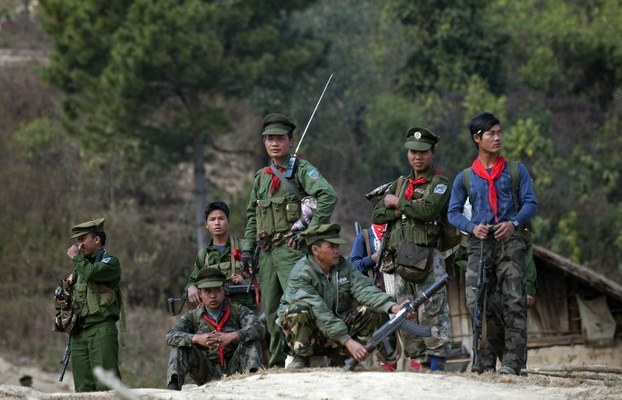




Leaders from an alliance of seven of Myanmar’s armed ethnic groups that did not sign a peace accord with the government last year held an emergency meeting on Thursday to discuss their strategy for dealing with the incoming government and current clashes in Shan state.
The United Nationalities Federal Council (UNFC) is holding a three-day meeting in Chiang Mai, Thailand, to discuss peace negotiations with the new National League for Democracy (NLD)-led government, which officially comes to power on Apr. 1.
The UNFC did not sign the government’s nationwide peace agreement (NCA) last October because it objected to the exclusion of all armed ethnic groups and disagreed with the political dialogue framework drafted by the signatories.
UNFC representatives also are discussing how to foster an all-inclusive peace process and end the recent military clashes between the Restoration Council of Shan State/Shan State Army-South (RCSS/SSA-S) and ethnic Palaung/Ta’ang National Liberation Army (TNLA) in northern Myanmar’s Shan state. The TNLA is a member of the UNFC.
“Some ethnic groups have signed a cease-fire agreement [with the government] and are already beginning political talks,” Nai Hong Sar, the UNFC’s vice chairman, told RFA’s Myanmar Service. “At the same time, there’s been fighting between Palaung troops and the RCSS, so we need to sit down together and draw up some appropriate plans that would suit the situation on the ground.”
The RCSS, the political organization that oversees the SSA-S, signed the NCA between the government and eight of the country’s armed ethnic groups last October. The TNLA, however, was excluded.
A month later, Myanmar’s army teamed up with the RCSS, and launched an offensive against the holdout rebel TNLA army in Shan state’s Namhkam township. The most recent hostilities between the two groups have forced 3,000 villagers in the area to flee their homes.
Participants at the UNFC meeting are discussing an agenda for future political dialogue, matters related to a constitution for a federal union which the armed ethnic groups are calling for, and a ceasefire between RCSS/SSA-S and TNLA, Nai Hong Sar said.
Lieutenant General N’ban La, UNFC chairman and vice chairman of the Kachin Independence Oganization (KIO) stressed the importance of discussing such issues.
“If we make mistakes, these would hugely affect our people and our country,” he told RFA. “So we must always keep that in mind and minimize our mistakes as much as possible. Otherwise, these talks will not lead us to the goals we want, but to more suffering. We already have suffered a lot.”
Meeting participants also are mulling whether the UNCF should accept the Rakhine National Organization and Arakan Army as members.
Reported by Aung Moe Myint for RFA’s Myanmar Service. Translated by Written in English by Roseanne Gerin.